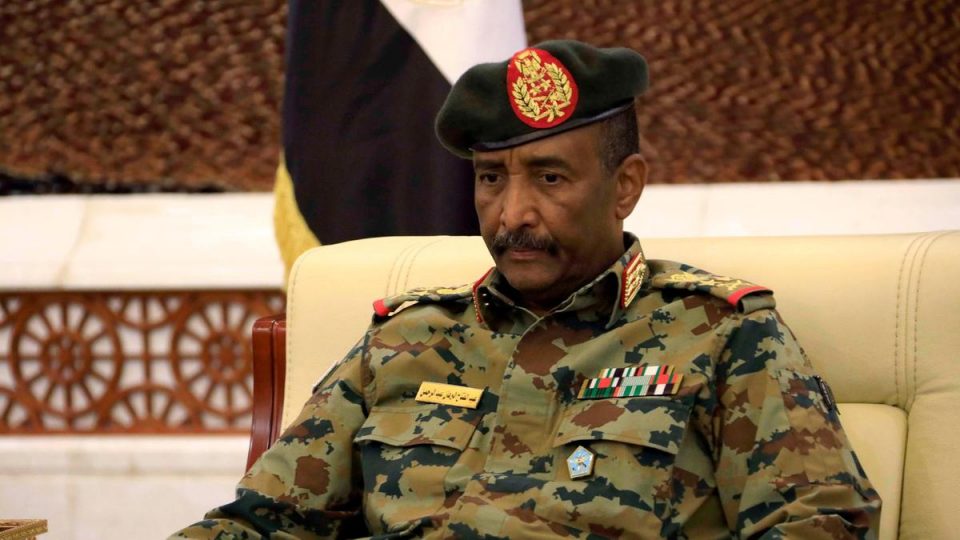General Abdel Fattah Al Burhan after being sworn in as head of Sudan’s newly formed sovereign council on August 21, 2019. EPA
——————————————————————————————————————————————————————————
Government objects to make-up and mandate of body decreed by military head of Sovereignty Council
——————————————————————————————————————————————————————————
December 8, 2020 10:44 AM
Tensions within Sudan’s civilian-military transitional administration broke into the open again at the weekend over a new body meant to act as a non-executive political facilitator but given wider powers by the army chief who also serves as the de facto head of state.
The civilian prime minister said the make-up and mandate of the 29-member council breached the interim constitution and did not include youths or women.
Relations between the government, led by economist Abdalla Hamdok, and the military component of the transitional administration led by Gen Abdel Fattah Al Burhan have been beset by bouts of tension since August last year when they agreed on a power-sharing deal for a transitional period before free elections are held in 2022. The agreement followed the military’s removal of dictator Omar Al Bashir in April 2019.
Gen Al Burhan is the chairman of the 11-member Sovereignty Council, making him the country’s de facto head of state. Mr Hamdok is head of the executive branch who has at times complained that the generals encroached on his and the Cabinet’s mandate.
AD

The latest friction began when Gen Al Burhan issued a decree last week to set up a new body called the “Council of the Partners of the Transitional Period” with himself as head. He named five generals, the prime minister, key figures in the pro-democracy movement that led to Al Bashir’s removal and representatives of rebel groups that signed a peace deal with the government as members.
In theory, the council would be dominated by the generals and representatives of the rebel groups who are known to be closer to the military than to civilians on the Sovereignty Council or the Cabinet.
With its present form and mandate, the council amounted to a “coup against the state’s civilian bodies … by giving it the right to decide on key issues”, civilian Sovereignty Council member Aisha Moussa was quoted as saying by the pan-Arab daily Asharq Al Awsat on Monday.
Gen Al Burhan’s decree said the new body’s task was to “direct” the transitional period in a way that serves the “high interests” of the nation and to narrow differences within the administration. It said the new body could assume additional powers, if necessary, to exercise its authority.
Information Minister Faisal Mohammed Saleh, also the government spokesman, said the decree was in breach of an agreement reached earlier on the council’s terms of reference. He said its members did not include a proportionate number of youths and women. “There is an impression now that the council will have supervisory powers over different agencies. That violates the agreement and the constitutional document,” said the minister in a statement.
“We fully understand the challenges of transition and those facing governance in its present form … it is our duty as Sudanese first and as an executive body in which the Sudanese people have placed their trust to protect the gains of the glorious December revolution to declare our opposition to the makeup of the Council of the Partners of the Transitional period in its present form,” he said.
“We call on all parties to reconsider the make-up and mandate” of the council, he added.
“There is a general impression that the new council will bolster the powers of the military,” said prominent Africa expert Hany Raslan of the Al Ahram Centre for Political and Strategic Studies. “It may be the start of excluding revolutionary forces from decision-making.”
The dispute is the latest sign of strains between the government and the military-led sovereignty council. Mr Hamdok took exception to a meeting in Uganda in February between Gen Al Burhan and Israeli Prime Minister Benjamin Netanyahu, arguing that neither he nor his government had been given advance notice. Sudan and Israel were technically in a state of war for decades until they agreed to normalise relations in September.
The civilian-led government has also protested against the military’s growing ties with Israel. Mr Saleh said a recent visit by an Israeli delegation to Sudanese military manufacturing facilities was made without the knowledge of the Cabinet.
Foreign relations are “supposed to be in the hands of the council of ministers”, he told S24, a Khartoum-based TV channel, on Saturday. “But matters related to normalisation have actually been unilaterally seized by the military.”
Other differences include the taxation of military-owned companies and the question of maintaining security in the capital Khartoum and other cities following an increase in street crime.
Statements, comments or opinions published in this column are of those of the author(s) and do not necessarily reflect the editorial policy of Warsan magazine. Warsan reserves the right to moderate, publish or delete a post without prior consultation with the author(s). To publish your article or your advertisement contact our editorial team at: warsan54@gmail.com

